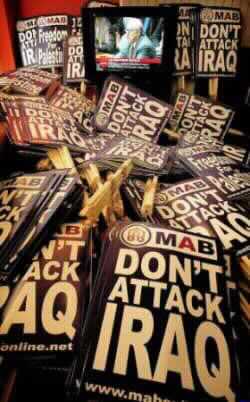Thousands of Australians kicked off global protests on Saturday against a looming U.S.-led war on Iraq in the biggest mass peace demonstrations since the Vietnam conflict. In the Australian city of Melbourne, 100,000 people demonstrated in a peace movement expected to spread to around 600 towns and cities around the world stretching from the far south to Iceland.
"This is a truly global movement. We are in contact with peace movements in the United States and across Europe," Stop The War UK leader Andrew Murray said.
Men, women and children joined in the Melbourne protest, chanting anti-war slogans and waving banners that read: "No blood for oil," "Don't bomb Iraq," and "We are all one."
The main target of the demonstration was President Bush and his thrust for war, but it was also directed at Australian Prime Minister John Howard who has joined British Prime Minister Tony Blair in committing troops.
In the Bahraini capital of Manama, home to the U.S. Fifth Fleet, about 200 protesters held an evening vigil in front of the U.N.
"We are Arabs and we think Saddam should go, but that is for the Iraqi people to decide and not the United States," said retired banker Ebrahim Al Sayed.
Massive Rallies to Come
The protests provided a foretaste of the massive rallies planned through the time zones around the world.
New York is gearing up for a large anti-war rally opposite U.N. headquarters, with more demonstrations planned across the United States.
In London, protest organizers said they expected a huge turnout. "We believe that the London demonstration will be one of the biggest and the most pivotal because the British government is actively involved in the build up to war and the British people definitely do not want war," Murray said.
Blair has unflinchingly supported Bush's tough stance on Iraq and has seen his popularity plunge in successive opinion polls as a result.
Blair was set to launch a staunch defense of his hawkish stance to wary members of his Labour Party at a conference in Glasgow in Scotland on Saturday, but he was likely to get a chilly reception from many of them.
Prominent American peace campaigner Jesse Jackson was in London to address the throng, which some expect could top one million people. Police have said more than 500,000 people could attend the march.
"Bush and Blair must listen to people around the world as they speak. Mr. Blair suggested that Saddam was just buying time. Well, time is cheaper and better than war," Jackson told British television.
London Mayor Ken Livingstone backed the marchers. "I am deeply concerned to protect the security of Londoners and safeguard the economy of the capital. That is why I am opposing this war."
Marches Across Europe
Across Europe, protesters were expected to turn out to show their distrust of Washington's motivations for war and their fears that the world could be engulfed in a wider conflict.
Protesters in Rome said they expected more than a million people to attend Saturday's peace march.
"This is not a political or union rally, this is a mobilization of feeling," organizer Carlo Testini said.
In Germany, where Chancellor Gerhard Schroeder opposes the war, peace groups expected more then 100,000 people to join protests around the country. "People think it's time to finally do something themselves," organizer Kathrin Vogler said.
In Paris, organizers expected more than 50,000 to take to the streets. "All the signs are extremely encouraging," said Arielle Denis, joint president of the Peace Movement, which is coordinating Saturday's marches in over 40 cities in France.
Protests were also due to be held in Russia, whose President Vladimir Putin agrees with France that more time is needed for U.N. inspectors to complete their work in Iraq, with war as a last resort.
Demonstrations were also planned in South Africa.
PHOTO CAPTION
Anti-war banners are seen in front of a television set at the Muslim Association of Great Britain in London as Chief U.N. weapons inspector Dr Hans Blix delivers his report on Iraq to the U.N., February 14, 2003. REUTERS/Peter Macdairmid
- Feb 14 11:36
- Author:
& News Agencies - Section:
WORLD HEADLINES


 Home
Home Discover Islam
Discover Islam Quran Recitations
Quran Recitations Lectures
Lectures
 Fatwa
Fatwa Articles
Articles Fiqh
Fiqh E-Books
E-Books Boys & Girls
Boys & Girls  Hajj Rulings
Hajj Rulings Hajj Fatwas
Hajj Fatwas














